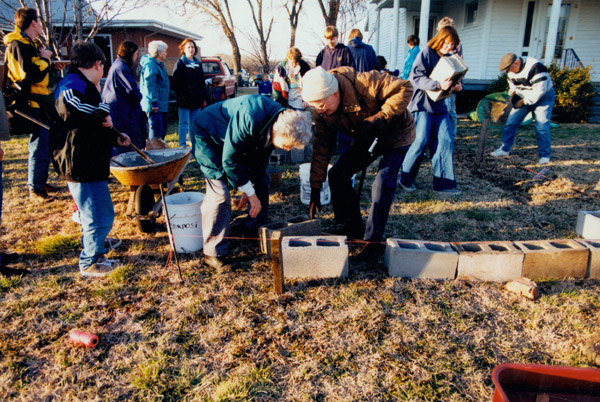
 September 2005
vol. 60 no. 3
Back to Table of Contents
September 2005
vol. 60 no. 3
Back to Table of Contents
Julie Hart, PhD, has been a professor of Sociology and Peace Studies at Bethel College in Newton, Kansas since 1994. She received her M.A. in International Peace Studies in 1991 and PhD in Sociology from the University of Notre Dame in 1995. During the summer months Julie serves as a reservist with Christian Peacemaker Teams in Israel/Palestine (1997-2000) and in Colombia (2004-5).
We never know when taking a clear position on social and political issues what the outcome will bring. The year was 1999, and our church, Shalom Mennonite in Newton, Kansas, had joined Christian Peacemaker Team's (CPT) Campaign for Secure Dwellings. As a reservist with CPT, I had spent one month during each of the previous two summers in Israel and the West Bank. I approached Shalom's Witness and Service Committee about joining the campaign to protect Palestinian homes from demolition by the Israeli military when the buildings stood in the way of Israeli plans for expansion of Jewish only settlements.

Shalom Mennonite Church had earlier decided to support Huda and Fayez Jabber, a young couple living on the outskirts of Hebron in the West Bank, whose home was threatened with demolition by a Jewish settlement that wanted to expand onto Fayez's ancestral land. As a church partner, Shalom was an advocate for the Jabbers.
For Easter that year, CPT had suggested a "Tents for Lent" campaign to draw attention to Palestinian home demolitions. Once a Palestinian family's home was demolished, they had nowhere to go and often were forced to live in a tent on their land.
Shalom's Witness and Service Committee approved the congregation's involvement the Tents for Lent campaign. We were ready to take a stand with a public witness on our church lawn. Since our church sits on First Street, a primary thoroughfare in Newton, we knew that we could draw the attention of many Newtonians to an injustice, and to an issue that affected all Americans, since U.S. policy indirectly supported the demolitions through the United States government's $3 billion annual budget of foreign aid to Israel.
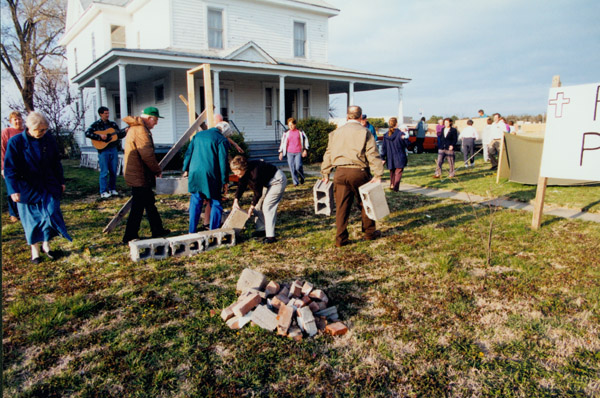
On the Saturday night before Easter, about 75 of us arrived at the church with our tents and sleeping bags, ready to hold a witness on the church lawn. We shared a Palestinian meal with assistance from a local Palestinian family. We held a worship service to prepare ourselves spiritually, and to educate our members about the situation. We erected a symbolic tent and a symbolic demolished home. To make our witness clear, we put up a large sign that read: "Israel, Stop Palestinian Home Demolitions."
In addition to the tents, we had brought children, guitars, games and marshmallows to roast. We had a great night of music, and we rose on Easter morning to a sunrise service on the lawn, where we prayed for a transformation in Israeli policy. It was an empowering experience, and we agreed to maintain the lawn display for a month. Our only regret was that the local newspaper had not come to cover the event.
The next day, Monday, I received a call from our pastor with a warning about our witness. It seems people were noticing our display. In fact, one local Jewish man, Mr. C., was so upset that he called the local newspaper to complain. Reporters came to the church, took a picture of an angry Mr. C. in front of our sign and gave him major front page coverage without consulting anyone from the church for an alternative view.
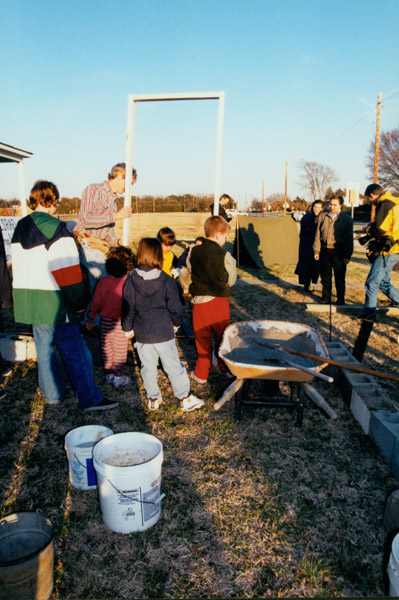
When I came home that evening and read the paper, I was caught off guard. Who was this man, and why had the newspaper not called me for a counter viewpoint? I knew what I had to do. As a Peace Studies professor at Bethel College, I was well versed in the importance of dialogue, active listening and sharing perspectives. I called Phil Stoltzfus, a colleague on the Bethel faculty, to ask for his support. Phil attended the Shalom church and was also familiar with the Israel/Palestine situation. Then I called Mr. C.
Mr. C. seemed very angry and closed as I identified myself and my involvement with the church display. I listened actively to his concerns and slowly his rhetoric de-escalated. Near the end of our 20-minute conversation, I asked if he might be willing to meet with Phil and me. Mr. C. reluctantly agreed.
That week, we had the first of three meetings over coffee to learn more about each other's concerns. Mr. C. had never been to Israel/Palestine but he was well versed in the Jewish perspective of what was occurring in the Holy Land. Phil and I were able to tell stories, show pictures and name names of Palestinian families who had lost their homes and livelihoods due to the demolitions.
Over time, we built a relationship of trust and care for each other. Mr. C. agreed that home demolitions were a barrier to the peace process. We were sensitized to the daily fear many Jewish people live with here and in Israel. A couple of weeks later, the three of us decided to write a joint newspaper column discussing what we had learned from each other. We asked the paper to avoid polarizing situations in the future, as they had by printing the one-sided initial article. We parted on friendly terms.
But that was not the end of the witness. It turned out that within our church we had a family with some Jewish roots, and they, too, were upset with the sign--so much that they decided to cover it with a sheet. Luckily, they also called a church elder with their concerns.
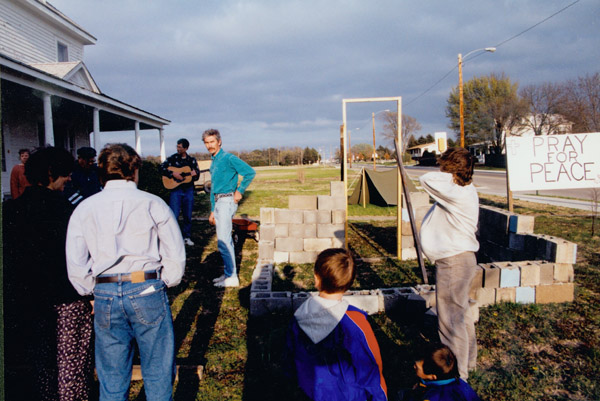
Phil and I began another series of dialogues, facilitated by our church elders. The couple came without their children but expressed concerns for the children's relationship with the church. Like Mr. C., they had no experience in Israel/Palestine and had much to learn about the situation there. More important though, was getting to the root of their concern and seeing if we could respond to it with integrity while maintaining our public witness.
Our solution was to eliminate the word "Israel" from the sign. Naming Israel felt anti-Semitic and threatened a nation these people loved. After much discussion, both the family from the church and Mr. C. agreed that Palestinian home demolitions were an unhelpful Israeli policy. Thus the display remained on the church lawn for the month with their blessing. In the end, our sign read simply:, "Stop Palestinian Home Demolitions!"
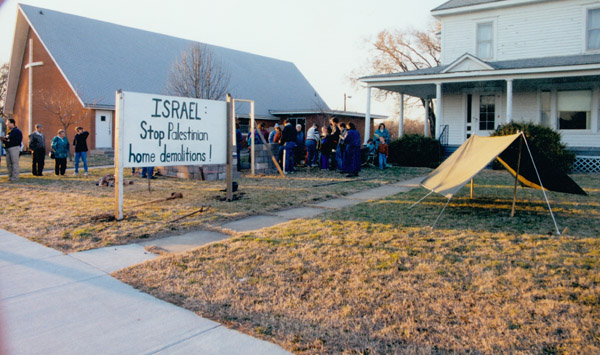
By the end of the month, our public witness had received plenty of attention and we had an opportunity to educate the church and the public further about the injustices being done in Israel/Palestine. Other area newspapers also covered the display when it raised controversy. Our witness resulted in new sensitivity on all sides to Jewish and Palestinian concerns and a chance to get to know some folks with Jewish roots more intimately. There was a tremendous investment of time and energy in scheduling meetings and listening compassionately to others' concerns. The congregation learned to dialogue through some difficult issues and to care for each other in the process.
In retrospect, this experience may have prepared the Shalom congregation for the difficult issues we would face in the next five years concerning a new church building, homosexuality and inclusion of a convicted sex offender within the congregation. So, the conflict was a blessing though a costly one in terms of time and energy. Being a prophetic voice against injustice often creates enemies. But thanks to the healing power of compassionate listening and dialogue, those enemies can become friends.